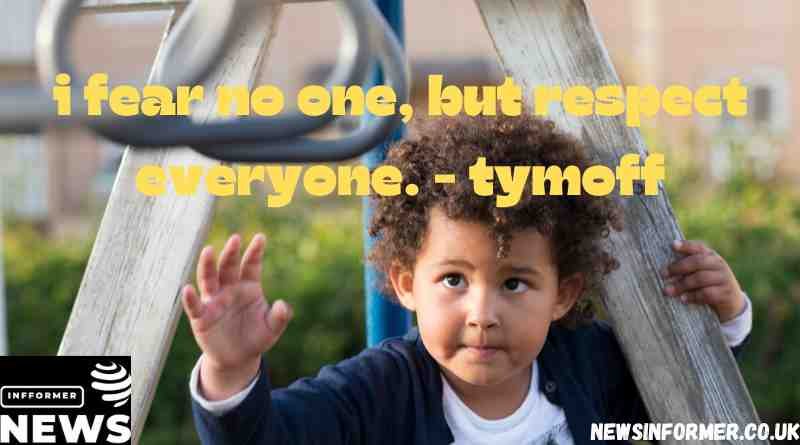I Fear No One, But Respect Everyone. – Tymoff: Embracing Confidence and Humility
In today’s world, where egos often clash and humility can be mistaken for weakness, the phrase “I fear no one, but respect everyone” by Tymoff encapsulates a powerful philosophy. This guiding principle teaches us the balance between self-confidence and respect for others, emphasizing that true strength lies not in overpowering others but in recognizing their worth. This article delves into the meaning and implications of this statement, exploring how it can shape personal development, relationships, and societal interactions.
Understanding Tymoff’s Philosophy
Tymoff’s assertion, “I fear no one, but respect everyone,” serves as a profound reminder of the importance of self-assuredness paired with humility. The statement encourages individuals to approach life with a fearless mindset, unperturbed by the opinions or actions of others. Simultaneously, it advocates for the universal respect of all individuals, acknowledging their inherent dignity and worth.
This philosophy challenges the traditional notion that strength is synonymous with dominance. Instead, it redefines strength as the ability to stand firm in one’s convictions while maintaining a deep respect for the diverse perspectives and experiences of others. By adopting this mindset, individuals can navigate the complexities of modern life with grace and resilience.
Building Unshakeable Confidence
Confidence is often misunderstood as arrogance or overconfidence. However, true confidence stems from a deep understanding of oneself, including one’s strengths and weaknesses. When Tymoff speaks of fearing no one, it is not about dismissing others but about cultivating a secure sense of self that is not easily shaken by external opinions or pressures.
Developing this kind of confidence requires introspection and self-awareness. It involves recognizing one’s value and abilities while also being honest about areas for improvement. This balanced view fosters a stable self-esteem that is not dependent on external validation. As a result, individuals can engage with the world from a place of security and assurance.
The Role of Respect in Personal Growth
Respecting everyone is integral to personal growth and social harmony. Respect goes beyond mere politeness; it is about acknowledging the intrinsic value of others and treating them with consideration and kindness. This aspect of Tymoff’s philosophy promotes empathy, compassion, and open-mindedness.
When we respect others, we create an environment where diverse ideas and perspectives are valued. This inclusivity can lead to richer interactions and more innovative solutions to problems. Furthermore, showing respect to others can strengthen relationships, build trust, and enhance collaborative efforts.
Respect also involves setting healthy boundaries. It means standing up for oneself without diminishing the worth of others. By respecting ourselves and others, we contribute to a more balanced and equitable society.
Confidence and Respect in Leadership
Effective leadership embodies the principles of confidence and respect. Leaders who fear no one are not intimidated by challenges or opposition. They are decisive, proactive, and resilient. However, the best leaders also respect everyone, valuing the contributions and perspectives of their team members.
Such leaders create a positive organizational culture where individuals feel valued and empowered. They listen actively, communicate openly, and foster an environment of mutual respect. This approach not only enhances team morale and productivity but also drives innovation and success.
Leaders who embrace Tymoff’s philosophy can inspire others to adopt the same mindset, creating a ripple effect that benefits the entire organization. By modeling confidence and respect, they set a standard for others to follow, promoting a culture of excellence and inclusivity.
The Impact on Personal Relationships
Applying Tymoff’s philosophy to personal relationships can transform the way we interact with others. Confidence allows us to communicate our needs and desires clearly, while respect ensures that we consider the feelings and perspectives of others. This balance is crucial for healthy and fulfilling relationships.
In friendships, confidence helps us be authentic and assertive, while respect fosters trust and mutual support. In romantic relationships, these principles can lead to deeper intimacy and stronger connections. By approaching relationships with confidence and respect, we can navigate conflicts constructively and build lasting bonds.
Moreover, respecting others in our personal lives can set a positive example for those around us, encouraging a culture of kindness and empathy. This can lead to more harmonious interactions and a stronger sense of community.
Societal Implications of Confidence and Respect
On a broader scale, adopting Tymoff’s philosophy can have significant societal implications. In a world often divided by differences, the principles of confidence and respect can bridge gaps and foster unity. When individuals fear no one, they are more likely to stand up against injustice and advocate for positive change. Simultaneously, respecting everyone promotes inclusivity and understanding, reducing prejudice and discrimination.

These principles can also enhance civic engagement. Confident individuals are more likely to participate in public discourse and take action on social issues. Respectful individuals are more open to diverse viewpoints and collaborative efforts, leading to more effective and equitable solutions.
Challenges in Practicing Tymoff’s Philosophy
While the principles of confidence and respect are compelling, practicing them consistently can be challenging. It requires ongoing self-reflection and a commitment to personal growth. In a world that often rewards aggression and self-interest, maintaining this balance can be difficult.
However, the rewards of embracing Tymoff’s philosophy far outweigh the challenges. By cultivating confidence and respect, we can lead more fulfilling lives, build stronger relationships, and contribute to a more just and compassionate society.
Practical Steps to Embrace Confidence and Respect
To incorporate Tymoff’s philosophy into our daily lives, we can take several practical steps:
- Self-Reflection: Regularly assess your strengths and areas for growth. Acknowledge your accomplishments and set realistic goals for improvement.
- Empathy: Practice empathy by actively listening to others and considering their perspectives. Engage in conversations with an open mind and a willingness to understand.
- Boundaries: Establish healthy boundaries that protect your well-being while respecting the needs and rights of others.
- Assertiveness: Communicate your thoughts and feelings clearly and respectfully. Stand up for yourself without diminishing others.
- Continuous Learning: Embrace lifelong learning and self-improvement. Seek feedback and be open to constructive criticism.
By integrating these practices into our lives, we can embody the principles of confidence and respect, leading to personal and societal transformation.
Conclusion
“I fear no one, but respect everyone” by Tymoff is more than just a statement; it is a guiding principle that can profoundly impact our lives and the world around us. By embracing confidence and respect, we can navigate life’s challenges with grace, build meaningful relationships, and contribute to a more just and compassionate society. As we strive to embody these principles, we can create a world where strength and humility coexist, fostering a culture of mutual respect and understanding.
Read also: check






















































